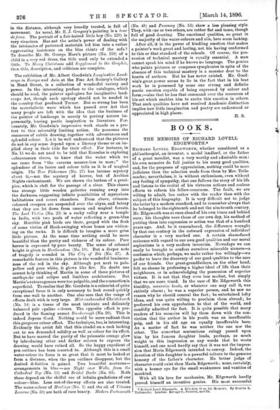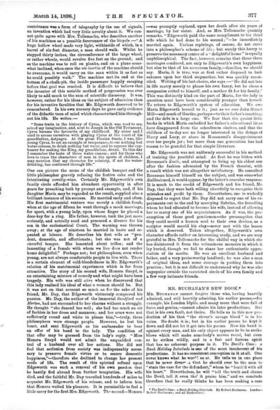BOOKS.
THE MEMOIRS OF RICHARD LOVELL EDGE WORTH.* RICHARD LOVELL EDGEWORTH, whether considered as a philanthropist, an inventor, a model landlord, or the father of a great novelist, was a very worthy and admirable man ; his own memoirs do full justice to his many good qualities, and, for the purposes of appreciation, nothing could be more judicious than the selection made from them by Mrs. Tolle- mache ; nevertheless, it is without enthusiasm, even without any feeling of sympathy, that one follows the story of his lift and listens to the recital of his virtuous actions and zealous efforts to reform his fellow-creatures. The fault, we are willing to admit, lies rather with the reader than with the subject of this biography. It is very difficult not to judge the latter by a modern standard, and to remember always that be belonged to the eighteenth and not the nineteenth century. Mr. Edgeworth was at once ahead of his own times and behind ours; his thoughts were those of our own day, his method of patting them into expression or action was that of a hundred years ago. And, be it remembered, the difference wrought by that one century in the outward expression of individual character is a very marked one. A certain shamefaced reticence with regard to our own good qualities and our moral aspirations is a very modern invention. Nowadays we can easily be brought to confess ourselves miserable sinners—a confession which, perhaps, we make rather too willingly—we prefer to leave the discovery of our good qualities to the care of our friends. Our great-grandfathers, on the other hand, felt no shame in professing a higher ideal of life than their neighbours, or in acknowledging the possession of superior virtues. It is not that they were less modest, but simply that we are more timid. In the case of Mr. Edgeworth this timidity, mauve lee honte, or whatever one may call it, was entirely absent ; he was a superior person, and he saw no reason why he should conceal the fact ; he entertained lofty ideas, and was quite willing to proclaim them abroad;, he preferred his own approbation to that of the world, and candidly admitted the fact. It is quite possible that many readers of his memoirs will lay them down with the con- viction that the author in his youth was an insufferable prig, and in his old age an equally insufferable bore. As a matter of fact he was neither the one nor the other. The somewhat sententious eulogy passed upon him by his famous daughter lends, perhaps, as much weight to this impression as any words that he wrote himself, and one need hardly say that it was not the impres- sion that Maria Edgeworth intended to convey. Indeed, the devotion of this daughter is a powerful tribute to the genuine honesty of the father's character. No better judge of character could exist than Maria Edgeworth; none, certainly, with a keener eye for the small weaknesses and vanities of mankind.
With all his love for mechanics, Mr. Edgeworth hardly proved himself an inventive genius. His most successful
• Richard Lovell Edgeworth. A Se'ertion from his Memoir3. By Bestrix L. Tollemache. London: Rir.ngt-m, Percival, and Co.
contrivance was a form of telegraphy by the use of signals, an invention which had very little novelty about it. We can- not quite agree with Mrs. Tollemache, who describes another of his machines as a possible forerunner of the bicycle :—" A huge hollow wheel made very light, withinside of which, in a
barrel of six-feet diameter, a man should walk. Whilst he stepped thirty inches, the circumference of the large wheel, or rather wheels, would revolve five feet on the ground; and as the machine was to roll on planks, and on a plane some- what inclined, when once the vis inertia of the machine should be overcome, it would carry on the man within it as fast as he could possibly walk." The machine met its end at the bottom of a chalk-pit, the inside passenger happily escaping before that goal was reached. It is difficult to believe that the inventor of this notable method of progression was ever likely to add much to the sum of scientific discovery. It was,
however, rather for his ideas on the subject of education than for his inventive faculties that Mr. Edgeworth deserved to be remembered. In his own nursery days he gave early evidence of the didactic turn of mind which characterised him through- out his life. He writes :—
" Some traits in the history of Cyrus, which was read to me, seized my imagination, and, next to Joseph in the Old Testament, Cyrus became the favourite of my childhood. My sister and I used to amuse ourselves with playing Cyrus at the court of his grandfather, Astyages. At the great Persian feasts, I was, like young Cyrus, to set an example of temperance,to eat nothing but water-cresses, to drink nothing but water, and to reprove the cup- bearer for making the King, my grandfather, drunk. To this day I remember the taste of those water creases; and for those who love to trace the characters of men in the sports of children, I may mention that my character for sobriety, if not for water- drinking, has continued through life."
One can picture the scene of the childish banquet and the
little philosopher gravely refusing the festive cake and the intoxicating cowslip-wine. Certainly Mr. Edgeworth's own family circle afforded him abundant opportunity in after
years for preaching both by precept and example, and, if his daughter Maria may be regarded as the result, supplied also a brilliant instance of his success. He married early and often. His first matrimonial venture was merely a childish freak, when at the age of fifteen he went through a mock marriage, for sport, with a young lady, upon whose finger he plaeed a door-key for a ring. His father, however, took the jest more seriously, and actually sued and procured a divorce for his son in the ecclesiastical Court. The warning was thrown
away ; at the age of nineteen he married in haste and re- pented at leisure. He describes his first wife as "pru- dent, domestic, and affectionate ; but she was not of a cheerful temper. She lamented about trifles ; and the lamenting of a female with whom we live does not render home delightful." Perhaps not; but philosophers, even when young, are not always comfortable people to live with. There is a certain element of cold-bloodedness in Mr. Edgeworth's relation of his matrimonial experiences which is far from attractive. The story of his second wife, Honore Sneyd, is an entertaining mixture of comedy and what might have been
tragedy. His wife was still alive when he discovered that this lady realised his ideal of what a woman should be. But it was not on that account so much as for the sake of his friend, Mr. Day, that Edgeworth virtuously conquered his passion. Mr. Day, the author of the immortal Sandford and Merton, had not succumbed to her charms without a struggle.
He thought "she danced too well ; she had too much an air of fashion in her dress and manners ; and her arms were not sufficiently round and white to please him,"—truly, these philosophers were strange people. However, he lost his heart, and sent Edgeworth as his ambassador to bear an offer of his hand to the lady. The condition of that offer may be guessed from the lady's reply. "Miss Honors, Sneyd would not admit the unqualified con- trol of a husband over all her actions. She did not feel that seclusion from society was indispensably neces- sary to preserve female virtue or to secure domestic happiness,"—therefore she declined to change her present mode of life. The result of this spirited refusal upon Edgeworth was such a renewal of his own passion that he hastily fled abroad from further temptation. His wife died, and the faithful Mr. Day travelled hundreds of miles to acquaint Mr. Edgeworth of his release, and to inform him that Honora waited his pleasure. It is permissible to feel a little sorry for the first Mrs. Edgeworth. The second—Honora
—was promptly replaced, upon her death after six years of marriage, by her sister. And, as Mrs. Tollemache quaintly remarks, "Edgeworth paid the same compliment to his third wife which he had done to his second ; "—he immediately married again. Useless repinings, of course, do not enter into a philosopher's scheme of life ; but surely this hurry to preserve the necessary centre of a 'delightful home" is equally unphilosophical. The fact, however, remains that these three marriages conduced, not only to Edgeworth's own happiness, but also to that of his numerous family,—families, we should say. Maria, it is true, was at first rather disposed to look askance upon her third stepmother, but was quickly recon- ciled. Writing of his last choice, she says :—" He did not late in life marry merely to please his own fancy, but he chose a companion suited to himself, and a mother fit for his family." This was distinctly kind on the part of Maria, for the lady in question must have been considerably younger than herself. To return to Edgeworth's system of education. We owe Maria Edgeworth herself to it ; just as we owe John Stuart Mill—and much of Goethe, perhaps—to their father's teaching; and the debt is a large one. We fear that the quaint little books in which Maria embodied her father's educational ideas have disappeared from the schoolroom shelves, and that the children of to-day are no longer interested in the doings of Harry and Lucy, or share in Rosamund's disappointment over her purple jar ; but more than one generation has had reason to be grateful for that simple literature.
Mr. Edgeworth was not uniformly successful in his method of training the youthful mind. At first he was bitten with
Rousseau's and attempted to bring up his eldest son after the fashion advocated by the French theorist, with a result which was not altogether satisfactory. He consulted Rousseau himself himself on the subject, and was somewhat disillusioned, it would appear, by the latter's oracular response. It is much to the credit of Edgeworth and his friend, Mr. Day, that they were both willing cheerfully to recognise their mistakes and profit by them. Nevertheless, one is wickedly disposed to regret that Mr. Day did not carry one of his ex- periments out to the end by marrying Sabrina, the foundling whom he had educated to become his wife, instead of allowing her to marry one of his acquaintances. As it was, the pre- sumption of these good gentlemen—the presumption that they could mould a human soul to their own devices, as a sculptor would mould his clay—never met with the lesson which it deserved. Taken altogether, Edgeworth's own character affords rather an interesting study, and we are very grateful to Mrs. Tollemache for the skilful way in which she has disinterred it from the voluminous memoirs in which it lay buried, though we fail to share her enthusiastic appre- ciation of its merits. He was an excellent husband and father, and a very praiseworthy landlord ; he was also a man of original ideas, and some courage in putting them into practice ; but it is not difficult to understand why he was also unpopular outside the restricted circle of his own family and a few very intimate friends.







































 Previous page
Previous page